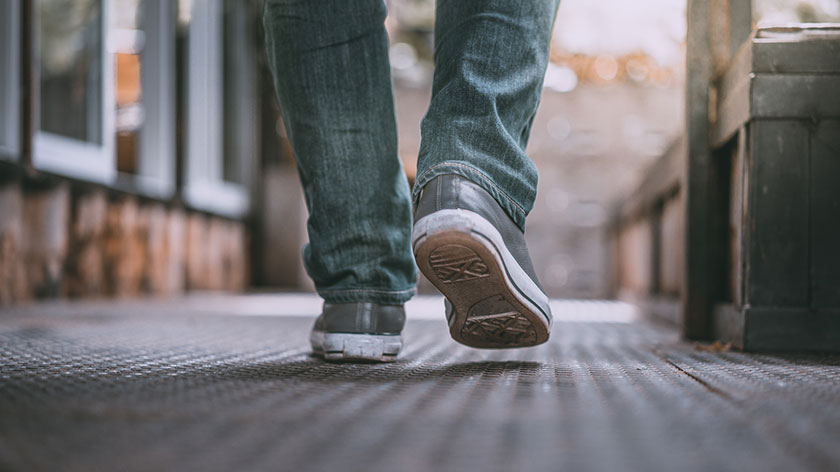Make the Most of Your Second Chance
More than 600,000 prisoners are released every year. Two out of three former prisoners will be rearrested again within three years.
How can returning citizens get out of prison—and stay out? It starts with baby steps. While many returning citizens are anxious to establish themselves, our field work experience indicates that it takes about three years for former prisoners to re-establish themselves.
This guide walks through a former prisoner's first three hours, days, months, and years of freedom, and offers a plan to help make the most of this second chance.
THE FIRST THREE HOURS: FACE YOUR FEARS
A Solid Plan for Your First Day Out Will Help Keep You on Course

Jill Colon was an accountant when she went to work for a fraudulent gold company. Her boss got federal time; she got state time in Florida. Ready to make a change, she joined a Celebrate Recovery group in prison and found two female Prison Fellowship® volunteers to mentor her.
Still, she grew anxious as her release date approached. She wondered how she would find a place to live and a way to pay the bills. With freedom comes great pressure.
As much as you might be looking forward to it, the thought of being released can also provoke a lot of fear and insecurity. You've probably seen enough friends come back to now it won't be easy.
Jill tackled her fears by working with her mentors to make specific, concrete plans. She applied for special transitional housing. She knew how she would get money for food and the medications she took. The day she was released, she had supportive people waiting to give her a ride to her new home.
Despite her anxiety—an emotion you might share—Jill was ready to succeed. She started preparing as early as possible. She sought accountability and good advice. And with a solid plan for her first 24 hours, she managed not to let her fears take her off course.
What will your first three hours of freedom look like? Like Jill, you might need a mentor who can guide you. If a mentor is unavailable, a friend who can be a positive influence or pastor and church may be able to step in.
FINDING A MENTOR
You may or may not have access to an "official" mentor, but you can still do some work to make sure you'll have some accountability and support right away. Find a Celebrate Recovery group that meets near where you'll be living. These groups are for anyone with hurts or bad habits—not just alcohol or drug dependence—and they'll give you some supportive community.
Also ask your chaplain or Prison Fellowship volunteer or staff member about churches that welcome returning citizens. Through a Celebrate Recovery group or church, you can identify someone with the right profile to mentor you and give you good counsel on navigating your transition.
THE FIRST THREE DAYS: FIND YOUR FOOTING
Freedom Can Be Disorienting; You Need to Find Your Footing

When you walk from a dark room into sunlight, it takes your eyes a few minutes to adjust. The first days out of prison can feel the same: intense, disorienting, and maybe frightening. You'll have a lot of decisions to make. The world may seem like it's moving too fast, and if you've been down a long time, new technologies might be unfamiliar. This is where a supportive mentor or community can make all the difference.
Having the right support in place was a big help to Reggie Holmes.
Reggie was a young kid when he fell in with a bad crowd and spent a short time in prison. As he prepared for his release, he was nervous about meeting with his parole officer. But his mentor, Stephan, took him to Goodwill and helped him find a set of professional clothes. Since his state allowed it, Stephan came along to Reggie's first meeting with the parole officer.
Stephan didn't do anything for Reggie that Reggie could do for himself, but he gave him daily encouragement and accountability as he got his identification, hunted for jobs, and established a new routine.
You might not think you'll need the extra support like Reggie did, but having someone on speed dial will help you manage unexpected setbacks when they come. When your tenth application for employment gets rejected, or when a drug-using friend from the past returns, you'll be glad to have someone you can turn to.
READ REGGIE'S STORY
With one terrible choice, Reggie's world suddenly seemed to have ended.
THE FIRST THREE MONTHS: FORM POSITIVE RELATIONSHIPS
Healthy and Positive Relationships Create Accountability and Community

John Krause sat in prison after a decades-long spiral of drugs, despair, and broken relationships. He hadn't just wrecked his own life; his three children were under three separate roofs. So, he made a promise: he would become the father his children needed, and when he got home with God's help, he would get his family back together.
John worked hard to fulfill his promise. In prison, he stayed connected with his children by taking advantage of Prison Fellowship's Angel Tree® Christmas program. When he got out, he remained clean and sober. He found a church, and he used his new connections to raise funds for a successful coffee-roasting business. The business has helped him build more positive community around him—and support his family. His children are now back under his roof, and he and his wife are expecting a new child.
In the first three months, as the newness of freedom wears off, loneliness will be your enemy. The isolation you feel will tempt you to form relationships with people who don't share your values—and that can signal trouble.
The best thing you can do is focus on repairing broken relationships and forming positive new ones, like John did.
READ JOHN'S STORY
At 14, John was an addict with an arrest record. He dropped out of high school and soon found a new way to dull his inner pain: meth.
THE FIRST THREE YEARS: GIVE BACK
You Got Out, You've Stayed Out—Now It’s Time to Live a Restored Life of Purpose and Hope

Diane Reyes was a two-time loser. Her second time around, she joined a long-term Prison Fellowship program for women preparing to return to society.
Three years after her release, she has graduated from community college, has a steady job, and plans to start her own HVAC business. She also goes back to prison to help other women like her.
Bill Loyd, a Prison Fellowship staff member, says, "People like her that come from backgrounds where they should have been dead, all the way now to caring and giving back and working with other women after sending time in prison—they're my heroes."
If, like Diane, you reach the three-year mark without another arrest, you are likely to remain out for good. At that point, you will probably have reached a place of stability and growth in your career and your relationships.
Look around and see what you have to contribute. Remember: the goal isn't just to stay out; it's to stay out so that you build a restored life of purpose and hope.
READ DIANE'S STORY
Diane Reyes doesn't want anyone to get the wrong idea about why she started selling drugs at 19. She doesn't blame her neighborhood and only speaks well of her parents. "I wanted to do it. It just gave me a thrill."
INSIDE JOURNAL
These resources are adapted from a special reentry edition of Prison Fellowship's quarterly newspaper, Inside Journal®. Because of this, each resource addresses the issues returning prisoners face.
Printed and distributed by Prison Fellowship to correctional facilities across the country, Inside Journal is written specifically for incarcerated men and women. Topics range from sharing the Gospel in a fresh way to offering encouragement and motivation through practical advice for the daily struggles of prison life.